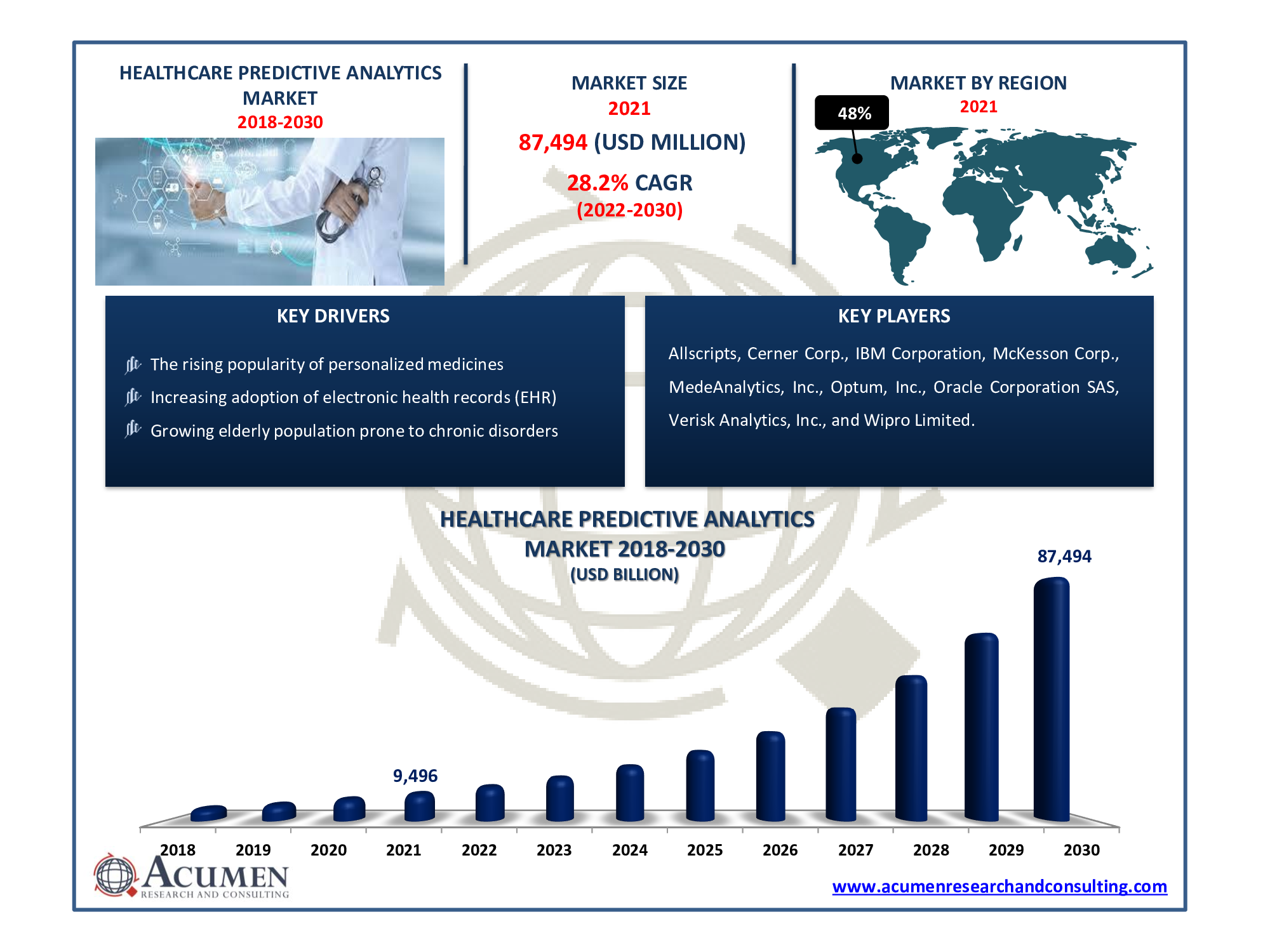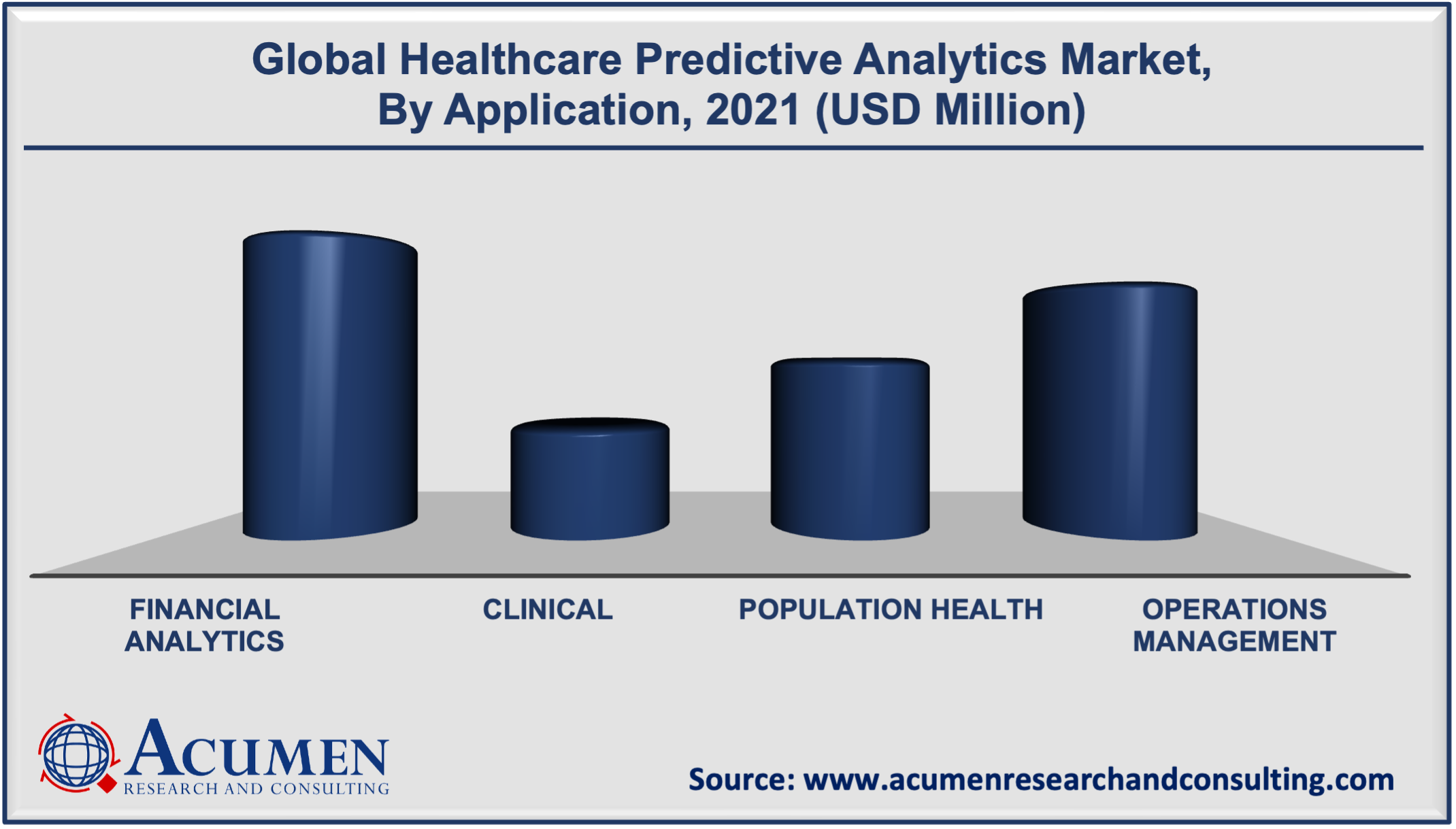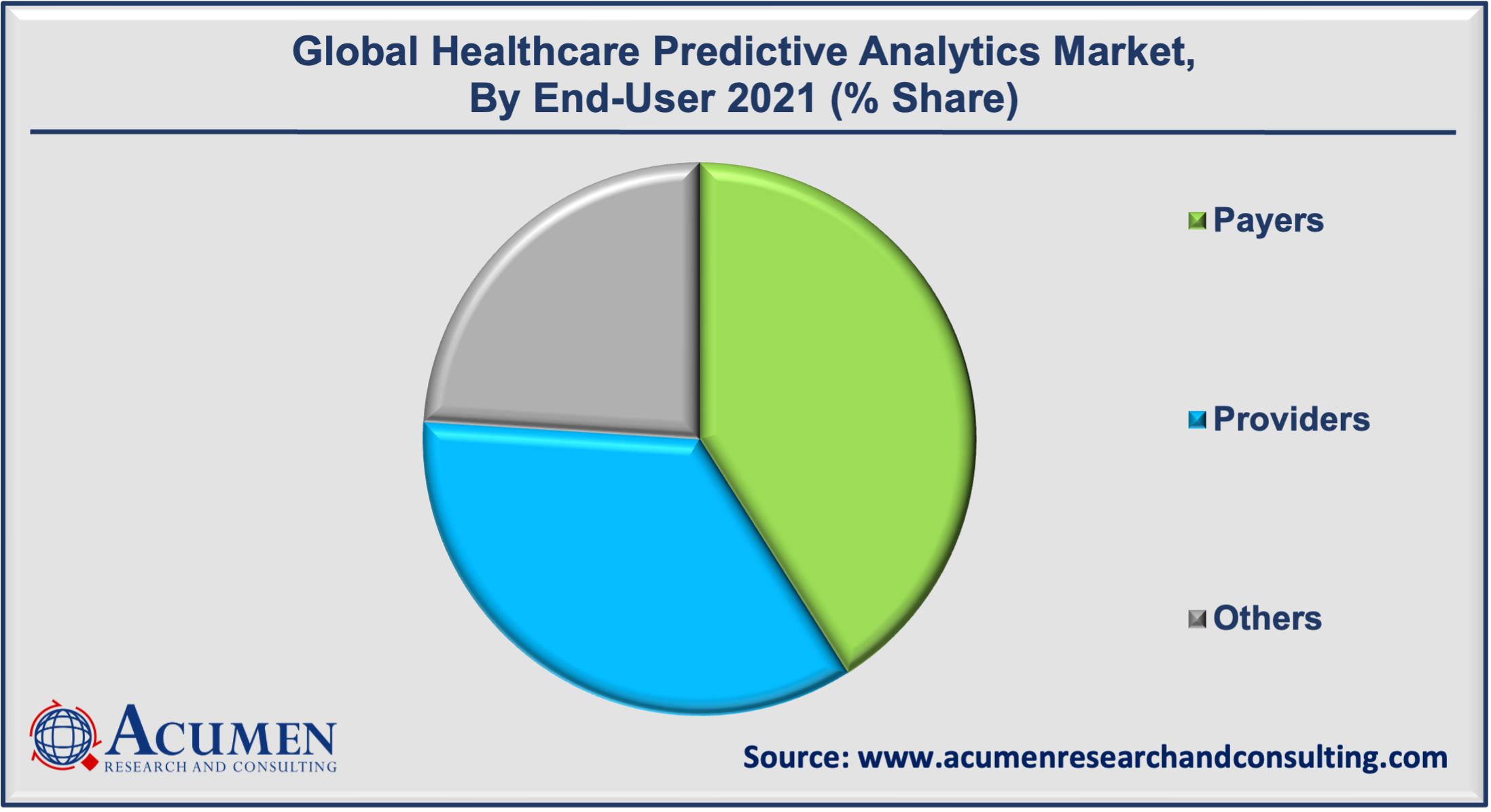Healthcare Predictive Analytics Market Analysis - Global Industry Size, Share, Trends and Forecast 2022 - 2030
Published :
Report ID:
Pages :
Format :
Healthcare Predictive Analytics Market Analysis - Global Industry Size, Share, Trends and Forecast 2022 - 2030
Report Coverage
- Industry Dynamics
- Market Size and Forecast Data
- Segment Analysis
- Competitive Landscape
- Regional Analysis with a Niche Focus on Country-Level Data
- High Level Analysis - Porter's, PESTEL, Value Chain, etc.
- Company Profiles of Key Players
- Option to Customize the Report As Per Your Specific Need
Request Sample Report
The Global Healthcare Predictive Analytics Market size was valued at USD 9,496 Million in 2021 and is estimated to reach USD 87,494 Million by 2030, at a CAGR of 28.2% from 2022 to 2030.

Healthcare predictive analytics market revenue is rapidly generating owing to the growing incidences of chronic disorders around the world. Predictive analytics in healthcare aims to warn clinicians and caregivers about the probability of outcomes and results before they happen, allowing them to prevent as well as cure health problems. By integrating predictive analytics into the healthcare system, providers have seen benefits for both patients and themselves. According to a recent Society of Actuaries (SOA)survey, 60% of healthcare professionals used predictive analytics within their organizations in 2019, and 20% of payers and providers began using predictive analytics in 2020. Predictive analytics is assisting the healthcare system shifting from treating patients as averages to treating patients as individuals, which can only improve overall patient care in terms of cost, efficiency, quality, and patient satisfaction. Furthermore, predictive analytics has played a significant role in combating COVID-19 issues, reducing the amount of poor outcomes for patients, and addressing resource management during the crisis. The adoption of AI and big data analytics in healthcare is one of the global healthcare predictive analytics market trends that fuels industry demand.
Healthcare Predictive Analytics Market Dynamics
Market Growth Drivers:
- The rising popularity of personalized medicines
- Increasing adoption of electronic health records (EHR)
- Growing elderly population prone to chronic disorders
- Surge in number of COVID-19 patients
Market Restraints:
- Data privacy and theft issues
- Lack of skilled professionals
Market Opportunities:
- Significant improvements in healthcare infrastructure
- The advent of advanced technologies such as AI, IoT, and big data analytics
Report Coverage
| Market | Healthcare Predictive Analytics Market |
| Market Size 2021 | USD 9,496 Million |
| Market Forecast 2030 | USD 87,494 Million |
| CAGR During 2022 - 2030 | 28.2% |
| Analysis Period | 2018 - 2030 |
| Base Year | 2021 |
| Forecast Data | 2022 - 2030 |
| Segments Covered | By Component, By Application, By End-User, And By Geography |
| Regional Scope | North America, Europe, Asia Pacific, Latin America, and Middle East & Africa |
| Key Companies Profiled | Allscripts, Cerner Corp., IBM, McKesson Corp., MedeAnalytics, Inc., Optum, Inc., Oracle, SAS, Verisk Analytics, Inc., and Wipro Limited. |
| Report Coverage |
Market Trends, Drivers, Restraints, Competitive Analysis, Player Profiling, Regulation Analysis |
| Customization Scope |
10 hrs of free customization and expert consultation |
The surging adoption of the electronic health record is one of the primary factors driving the healthcare predictive analytics market share. For example, predictive analytics in healthcare aggregates massive amounts of patient data inbound from electronic health records (EHR), administrative paperwork, insurance claims, medical imaging, and other sources and processes it in search of patterns. Predictive analytics in healthcare has enabled healthcare providers to figure out which diseases are patients likely to develop, will they return to the hospital within 30 days of discharge, and how will they respond to different treatments.
Additionally, the augment of artificial intelligence (AI), the internet of things (IoT), and big data analytics has proven to be a cutting-edge technology to treat patients in a better way. Healthcare providers now have techniques that can be fed with historical along with real-time data to make valuable predictions, thanks to the rise of AI and IoT. Such predictive algorithms can be used to help individual patients make clinical decisions as well as to inform interventions at the cohort or population level. They can also be used to address operational and administrative issues in hospitals. Additionally, the growing trend of personalized medicines and the increasing number of frequent healthcare data are some of the factors driving the global healthcare predictive analytics industry growth.
However, the market growth is hampered by several major factors, including rising data privacy and theft concerns, as well as a scarcity of skilled professionals to work on these technologies. The growing number of cybercrime and data hacking events is a major source of concern for the industry. Furthermore, dealing with predictive analytics necessitates a high level of technical and statistical knowledge. Currently, there aren't many professionals and experts working in this field, which may slow market growth for a few years.But the market is expected to perform well in the coming period especially with the advent of new courses in the field of clinical informatics.
Healthcare Predictive Analytics Market Segmentation
The global healthcare predictive analytics market segmentation is based on component, application, end-user, and region.
Market by Component
- Hardware
- Services
- Software
Based on component, the services segment held prominent healthcare predictive analytics market revenue in 2021 and is likely to do the same throughout the forecasted years 2022 – 2030. In comparison to other industries, the healthcare industry has been slow to adopt technology (such as retail, and finance, among others). Therefore, the industry is heavily reliant on services instead of investing in the entire technological infrastructure to keep operational costs in check. In addition, some of the factors driving the demand for services segment include a shortage of skilled professionals in healthcare IT, rapid technological advancements in healthcare analytics solutions, a greater emphasis on value-based care, and rising adoption of cloud-based deployment models.
Market by Application
- Financial Analytics
- Clinical
- Population Health
- Operations Management

As per our analysis, the financial analytics segment accounted for the largest healthcare predictive analytics industry share in 2021. This is attributed to an increase in the number of financial frauds occurring around the world. Currently, the majority of revenue is spent on financial analytics to reduce billions of dollars in fraud each year. For example, the National Healthcare Fraud Association estimates that nearly US$ 80 billion in fraud occurs in the United States each year. However, the population health segment is observed to attain a substantial growth rate throughout the forecasted timeframe from 2022 to 2030.
Market by End-User
- Payers
- Providers
- Others

Based on the end-user, the payers segment generated considerable revenue during the projected years. Predictive analytics is primarily used by health insurers, health plan funding agencies, and other third-party payers to analyze insurance claims, prevent and detect fraudulent claims, and evaluate disease risk. False claims can be tracked, and payers can save billions of dollars. As a result, healthcare predictive analytics software benefits payers more than other end-users.
Healthcare Predictive Analytics Market Regional Overview
North America
- U.S.
- Canada
Europe
- U.K.
- Germany
- France
- Spain
- Rest of Europe
Latin America
- Mexico
- Brazil
- Rest of Latin America
Asia-Pacific
- India
- Japan
- China
- Australia
- South Korea
- Rest of Asia-Pacific
The Middle East & Africa (MEA)
- Gulf Cooperation Council (GCC)
- South Africa
- Rest of the Middle East & Africa
Presence of Large Number of Prominent Companies in North America Fuels The Regional Market Growth
According to regional analysis, the North America region dominated the global healthcare predictive analytics market from 2022 to 2030. In the domain of predictive analytics, the healthcare infrastructure in the U. S. is experiencing positive trends. According to studies, more than 40% of healthcare practitioners have reported a 50% increment volume in the last few years. Additionally, the presence of key players across various countries in this region supports the regional market to grow rapidly. Furthermore, the Asia-Pacific region is projected to witness the fastest growth rate CAGR all through the forecast timeframe from 2022 to 2030.
Healthcare Predictive Analytics Market Players
Some of the top healthcare predictive analytics companies offered in the professional report include Allscripts, Cerner Corp., IBM, McKesson Corp., MedeAnalytics, Inc., Optum, Inc., Oracle, SAS, Verisk Analytics, Inc., and Wipro Limited.
Frequently Asked Questions
How big was the market size of global healthcare predictive analytics market in 2021?
The global healthcare predictive analytics market size was USD9,496 Million in 2021.
What will be the projected CAGR for global healthcare predictive analytics market during forecast period of 2022 to 2030?
The projected CAGR of healthcare predictive analytics market during the analysis period of 2022 to 2030 is 28.2%.
Which are the prominent competitors operating in the market?
The prominent players of the global healthcare predictive analytics market involve Allscripts, Cerner Corp., IBM, McKesson Corp., Mede Analytics, Inc., Optum, Inc., Oracle, SAS, Verisk Analytics, Inc., and Wipro Limited.
Which region held the dominating position in the global healthcare predictive analytics market?
North America held the dominating share for healthcare predictive analytics during the analysis period of 2022 to 2030.
Which region exhibited the fastest growing CAGR for the forecast period of 2022 to 2030?
Asia-Pacific region exhibited fastest growing CAGR for healthcare predictive analytics during the analysis period of 2022 to 2030.
What are the current trends and dynamics in the global healthcare predictive analytics market?
The rising popularity of personalized medicines, increasing adoption of electronic health records (EHR), and growing elderly population prone to chronic disorders drives the growth of global healthcare predictive analytics market.
By segment component, which sub-segment held the maximum share?
Based on component, services segment held the maximum share for healthcare predictive analytics market in 2021.


